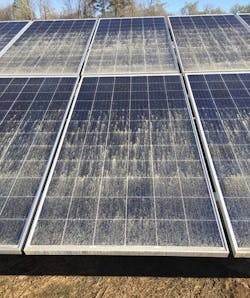NREL: Need More than Rain to Wash Away Pollen from Solar Panels
Researchers from the U.S. Department of Energy’s National Renewable Energy Laboratory (NREL) have examined the effects of pollen on the performance of five utility-scale solar plants in North Carolina.
The research paper, “An Investigation on the Pollen-Induced Soiling Losses in Utility-Scale PV Plants,” was published in the IEEE Journal of Photovoltaics and describes the problem with pollen.
The scientists, headed by the NREL team, revealed that the proliferation of springtime pollen coating the solar panels reduced performance of the technology at every site. While rainfall could remove some of the pollen, it was not enough to return photovoltaic (PV) performance to optimal levels.
“There is still much work to do to fully understand the risks and implications of pollen and bio-soiling in the southeast U.S., but this work has made clear that regular rainfall is not sufficient to assume that solar plants are fully cleaned in certain environments,” said Matthew Muller, a research engineer within the PV Performance and Reliability group at NREL and co-author of the research paper.
Soiling is found to be an ongoing problem in terms of PV performance and realized revenue for solar plant operators. According to studies, soiling losses are expected in arid and semi-arid locations and not in rainier locations such as the southeastern U.S., having pollen as a problem.
While studying the soiling problem, Muller and his colleagues measured the effects of the utility-scale solar plants in four counties in North Carolina. They found that frequent rainfall is expected to result in negligible soiling impacts.
They also found the performance of the solar panels decreased by about 15 percent during peak pollen season, with most pollens coming from cypress, juniper, pine, and oak trees. The data suggested that annual production losses are anticipated on the order of 10 percent without planned cleaning.
During the analysis, the solar plants were operational for more than seven years, without any manual cleaning. However, post mechanical wet brush cleaning, performance increased from 5 percent to 11 percent, as measured by Solar Unsoiled working with the system owners.
The findings highlighted that soiling needs to be examined in regions with frequent rainfall and planned cleaning is necessary to avoid large financial losses and system underperformance.
Owing to this research, NREL and Solar Unsoiled are designing a study to further investigate the mechanisms and risks associated with pollen and bio-soiling in the southeastern U.S.
About the Author
EnergyTech Staff
Rod Walton is senior editor for EnergyTech.com. He has spent 17 years covering the energy industry as a newspaper and trade journalist.
Walton formerly was energy writer and business editor at the Tulsa World. Later, he spent six years covering the electricity power sector for Pennwell and Clarion Events. He joined Endeavor and EnergyTech in November 2021.
He can be reached at [email protected].
EnergyTech is focused on the mission critical and large-scale energy users and their sustainability and resiliency goals. These include the commercial and industrial sectors, as well as the military, universities, data centers and microgrids.
Many large-scale energy users such as Fortune 500 companies, and mission-critical users such as military bases, universities, healthcare facilities, public safety and data centers, shifting their energy priorities to reach net-zero carbon goals within the coming decades. These include plans for renewable energy power purchase agreements, but also on-site resiliency projects such as microgrids, combined heat and power, rooftop solar, energy storage, digitalization and building efficiency upgrades.
